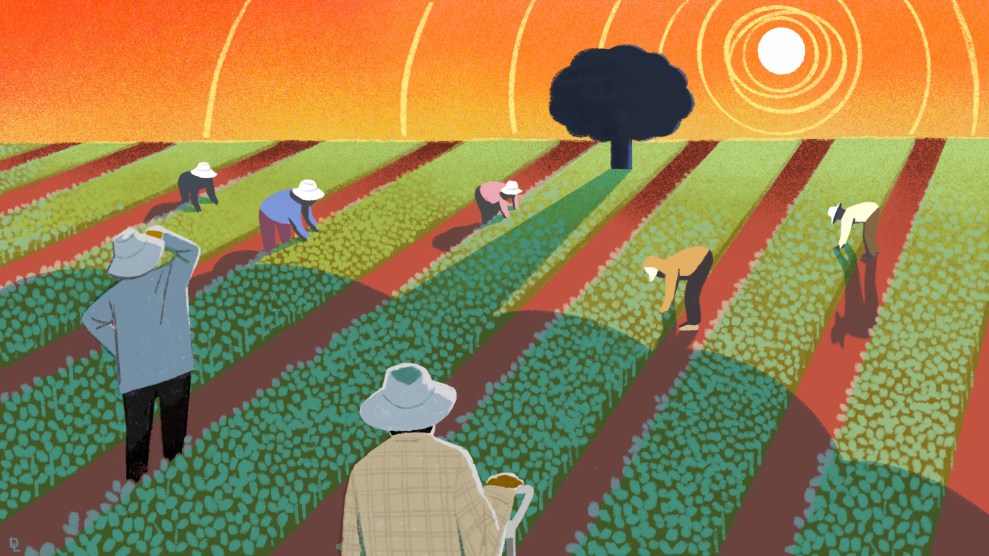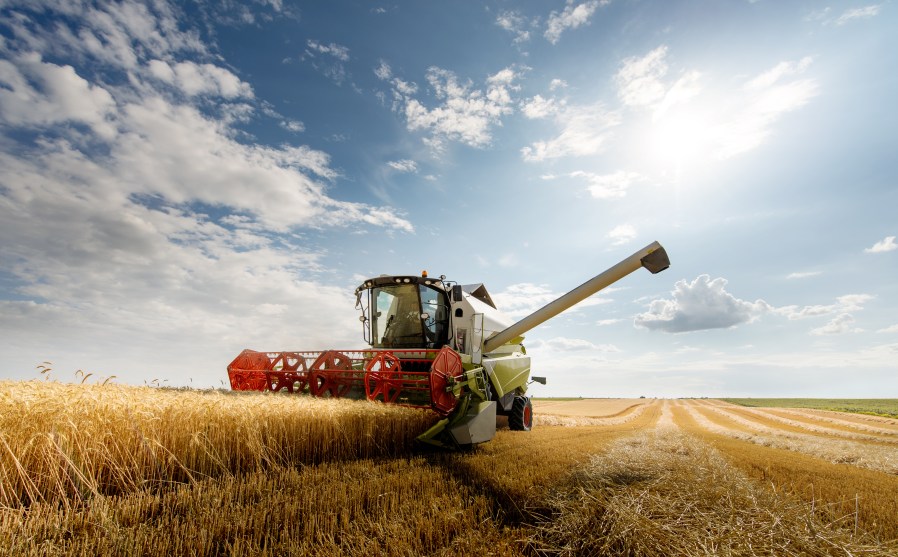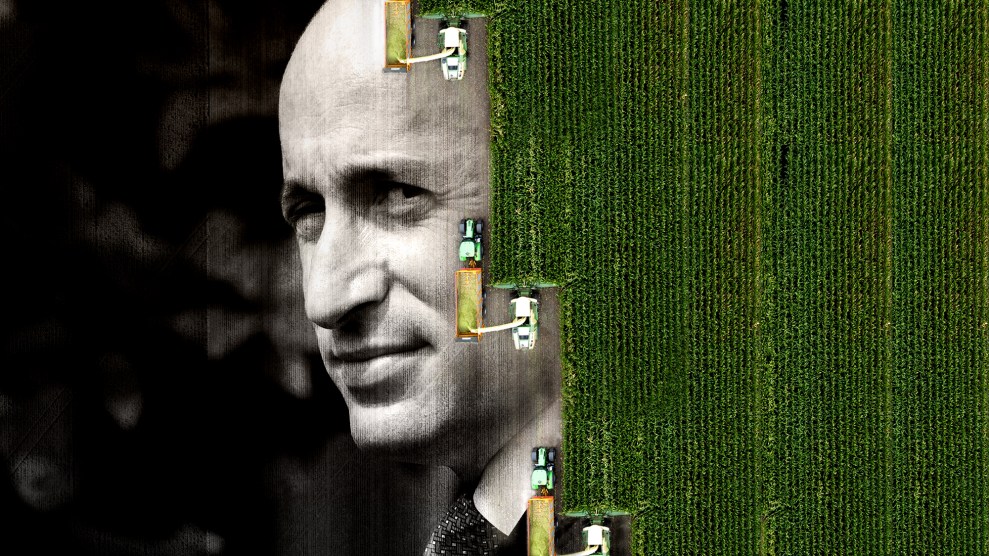
Sen. Debbie Stabenow (D-MI) at a US Capitol press conference.Michael Brochstein/Zuma
This story was originally published by Grist and is reproduced here as part of the Climate Desk collaboration.
On Monday, Senator Debbie Stabenow, a longtime champion of programs that support farmers and increase access to nutritious foods, introduced a new version of the farm bill, a key piece of legislation typically renewed every five years that governs much of how the agricultural industry in the US operates.
Stabenow, who is retiring next month after representing Michigan in the Senate for 24 years, has staked her career on her vision for a robust, progressive farm bill, one that, among other things, paves the way for farmers to endure the worst impacts of the climate crisis.
The text of her bill comes almost two months after the 2018 farm bill, which initially expired last year and was revived thanks to a one-year extension, expired for a second time on September 30. And it comes mere weeks before the end of the year, when funding for several programs included in the farm bill will run out.
But more importantly, the bill comes after many months of infighting between Democratic and Republican lawmakers over what matters most in the next farm bill—and just weeks before the current congressional term ends. In order to pass the bill, Stabenow would need to gain the support of Republicans in the Senate agriculture committee and the House of Representatives, where Democrats lack the votes necessary to pass their own version of the legislation.
It’s likely, even expected, that that won’t happen. Sen. John Boozman, a Republican from Arkansas who is likely to chair the Senate agriculture committee after Stabenow’s retirement, criticized her bill on X, calling it an “insulting 11th hour partisan proposal.” Meanwhile, in the House, Republicans are reportedly hoping instead to pass another one-year extension of the farm bill, pushing negotiations over the new bill into next year, according to Politico.
There’s virtually no reason for Republicans not to prolong the process of hammering out the next farm bill, as starting in January they will have majority control over the legislative, judicial, and executive branches of the federal government.
By proposing legislation that’s all but doomed, Stabenow may be vying to secure her legacy as an environmental steward who understands how climate change is already impacting agricultural production, and why there should be more investment in climate initiatives that safeguard farmers now.
In a speech presenting the details of her bill to the Senate on Monday, Stabenow said, “For more than two years I’ve been working with colleagues on both sides of the aisle to pass my sixth Farm Bill, the third one that I’ve either been chair or ranking member of…the Senate Committee on Agriculture, Nutrition, and Forestry.”
She emphasized that farming is a risky business given its dependence on the weather. “But it’s getting even riskier now, because [of] what’s happening with the climate crisis, and we know that,” she said. “How many once-in-a-generation storms or droughts need to hit our farmers over the head before we take this crisis seriously?”
Certain advocacy groups have praised Stabenow’s farm bill. Rebecca Riley, the managing director for food and agriculture at the National Resources Defense Council, an environmental group, said the bill reflects Stabenow’s “decades of leadership and dedication to strengthening America’s farmers and rural communities.” But other groups were slower to respond. In a statement, the American Farm Bureau Federation, an agricultural industry group, said simply: “We’re reviewing Chairwoman Stabenow’s newly released 1,300 pages of farm bill text,” adding that it’s “unfortunate that only a few legislative working days remain for Congress to act.” (Stabenow’s office did not reply to Grist’s requests for comment.)
One of the key features of Stabenow’s farm bill is funding for so-called “climate-smart” agriculture practices, an umbrella term that broadly refers to techniques that help farmers sequester carbon in the soil rather than emit more of it into the atmosphere, where it contributes to global warming. The 2022 Inflation Reduction Act allocated nearly $20 billion in funding for these practices, such as crop rotation and no-till farming. And in the spring, Stabenow introduced a framework that rolled over the leftover money from the IRA for “climate-smart” practices into a new farm bill. (Shortly afterwards, Senate Republicans put forward another draft of the farm bill without this provision.)
Climate is hardly the only focus of the text Stabenow introduced earlier this week, which, like all farm bills, seeks to address a dizzying array of agricultural and nutritional priorities. Chief among the provisions in her bill, titled the Rural Prosperity and Food Security Act, are policies that aim to increase access to crop insurance and make coverage more affordable by boosting premium subsidies. The bill also seeks to invest $4.3 billion in rural communities, seeking to improve their access to health care, childcare, education, and broadband internet.
But other provisions indicate that Stabenow has long been thinking of how to further protect farmers from climate impacts such as extreme weather—and also make the US food system more diversified and resilient. She proposes creating a permanent disaster program that would establish a consistent process for providing farmers with assistance after floods, wildfires, and other calamities. Stabenow also seeks to strengthen support for specialty crops—better known as fruits, nuts, vegetables, and herbs—and reminds the Senate during her press briefing that these crops “are almost half of what we grow.”
hese details represent some of the divisions that run deep through congressional negotiations. Senator John Hoeven, the Republican congressman from North Dakota, was quick to dismiss Stabenow’s vision, writing on X, “Unfortunately, the Senate bill released today does not meet the needs of farm country and fails to keep farm in the Farm Bill.” Boozman has signaled he fully intends to ignore Stabenow’s last-minute bill, telling reporters that Congress must push for another extension of the 2018 farm bill and meeting with agriculture industry groups to discuss their priorities.
Boozman’s and other Republicans’ concerns with the new farm bill text likely stem, at least in part, from lobbying groups representing large-scale, industrial farmers who wish to see fewer restrictions placed on how they do business. The National Pork Producers Council, or NPPC, for example, issued an instant rejection of Stabenow’s farm bill text, calling it “simply not a viable bill” for “fail[ing] to provide a solution to California Prop. 12.”
That proposition prohibits the sale of veal, pork, and egg products by farm owners and operators who knowingly house animals “in a cruel manner.” The NPPC has followed this issue closely, arguing that forcing pork producers to comply with “arbitrary” animal housing specifications would wildly increase their costs (and prices for consumers). The group successfully lobbied for a provision in the House farm bill that essentially takes away California’s power to enforce such a law—by blocking state and local government from imposing conditions on the production of livestock sold in their jurisdiction (unless the livestock is actually produced within the state or local community).
Stabenow seems highly aware of the zero-sum framework with which many different actors view the farm bill. When addressing the Senate, she mentioned that the version of the Farm Bill released by the House in May would have put “immense” resources into a small number of commodity farmers in the South. “I’m not saying that these farmers don’t need support. They do,” she said. “But it can’t be at the expense of millions of other farmers and ranchers in this country,” including those who run smaller, diversified operations or who grow fruits and vegetables.
In her speech, Stabenow repeatedly framed the text of her bill as a bipartisan project, and projected an urgency to secure wider resources for more farmers now. Her vision, she says, “can pass and should pass.” But whether that’s true or not will depend an awful lot on her colleagues, who currently have no incentive to negotiate with her and other Democrats and could simply wait to push forward their own agenda. How long they wait remains to be seen.
















